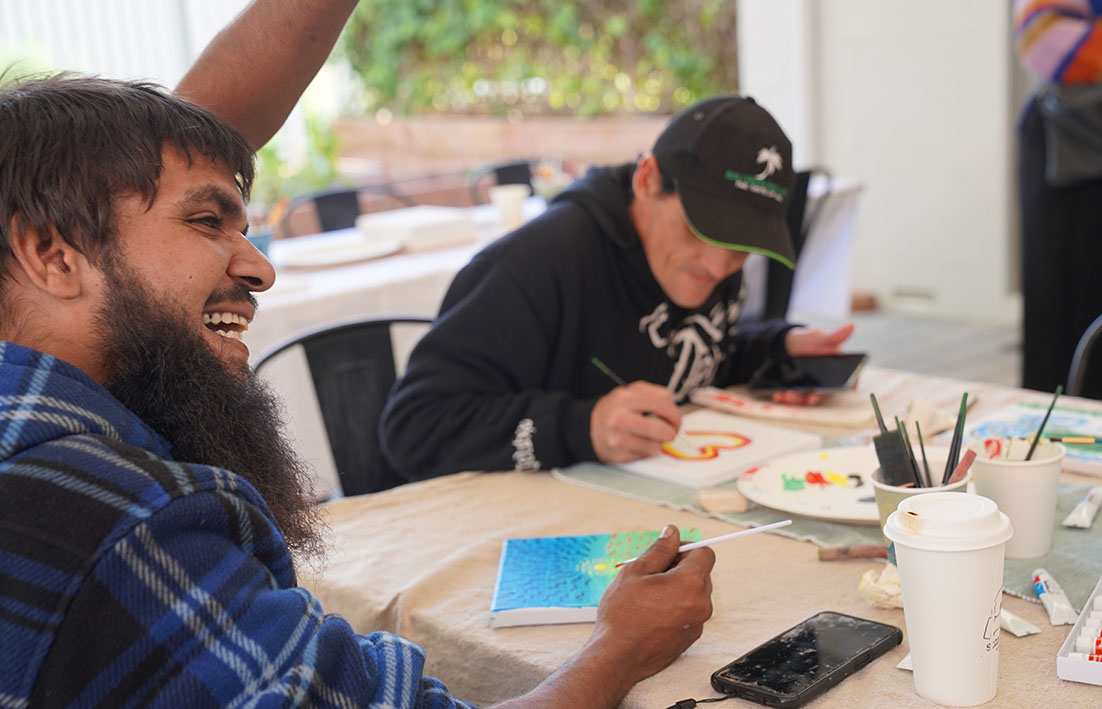
BEHIND Karlup Engagement Hub’s red gates patterned with eucalyptus leaves, homelessness service workers and residents of Midland gathered on Tuesday for a morning of art, soup and connection.
Homelessness Week is hosted annually to build community support and government commitment to end homelessness.
Indigo Junction held a paint and soup event in support of Homelessness Week 2024, where attendees could enjoy free soup along with a painting session.
Echo News attended the event where the engagement hub was busy with activity as homelessness service members worked in the kitchen to prepare the soups, and set out bread rolls and bottled water for attendees.
Indigo Junction chief executive officer Sharon Gough spoke with service workers and watched as Indigo Junction workers and clients painted together at their tables.
Ms Gough said Midland had a high rate of homeless families, compared with other areas where it was more common to see individual adults who had become homeless.
“A lot of people come through with babies, and are fathers or mothers, who are sleeping in cars,” she said.
“It’s different from somewhere like Fremantle where you see relatively more adult homeless clients come through the system.”
Census data shows a recorded increase of 378 rough sleepers in the City of Swan between 2016 and 2021.
Forty-three per cent of the people recorded were identified in the Midland and Guildford area.
The increase in total recorded homeless figures including couch surfers, supported accommodation, and other forms of homelessness showed a jump of 622 in Swan in the five-year span.
This is the highest recorded increase in rough sleepers and recorded increase in total numbers of homeless people in the Perth metropolitan area.
Cost of living pressures have continued to rise in the area as rental prices have increased.
Data from SQM research show the median rental price in Midland is now $569 per week.
This is up from $483 per week in 2023 and $324 per week four years ago in 2020.
An Indigo Junction spokesperson said the recorded number of rough sleepers had increased in 2024.
“Indigo Junction’s homelessness engagement assessment response team (HEART) has identified an increase in people sleeping rough in the Midland area, with 22 newly identified clients recorded in the three months (between) March 1, 2024 and June 19, 2024,” they said.
“The ABS index of relative socio-economic disadvantage places Midland in the 38th percentile, with the broader NE Metropolitan area in the 46th percentile.
“This is indicative of a relatively high level of disadvantage in the area.”
Unemployment, low incomes or education levels, single parent families, low skilled occupations, or poor English proficiency are examples of disadvantage indicators used by the ABS index.
The spokesperson said a dedicated network of local service providers, government agencies and businesses were developing a plan to end homelessness in Midland and surrounds.
“The Midland Alliance (to end homelessness) is currently developing its own action plan to guide a collaborative and place-based collective impact approach to ending homelessness in Midland and the surrounding community,” they said.
Ms Gough said recent funding uplift and support for the HEART program in the Midland area has improved Indigo Junction’s capacity to support the growing numbers of people impacted by homelessness in the community.
“This funding is long overdue and demonstrates a genuine commitment from this government to work in partnership with homelessness service providers in responding to the housing crisis.
Ms Gough said homelessness is a problem that can be solved.
“There are many international examples of where this has been achieved. We have exciting plans for growth and will continue to respond to the needs of this community. “